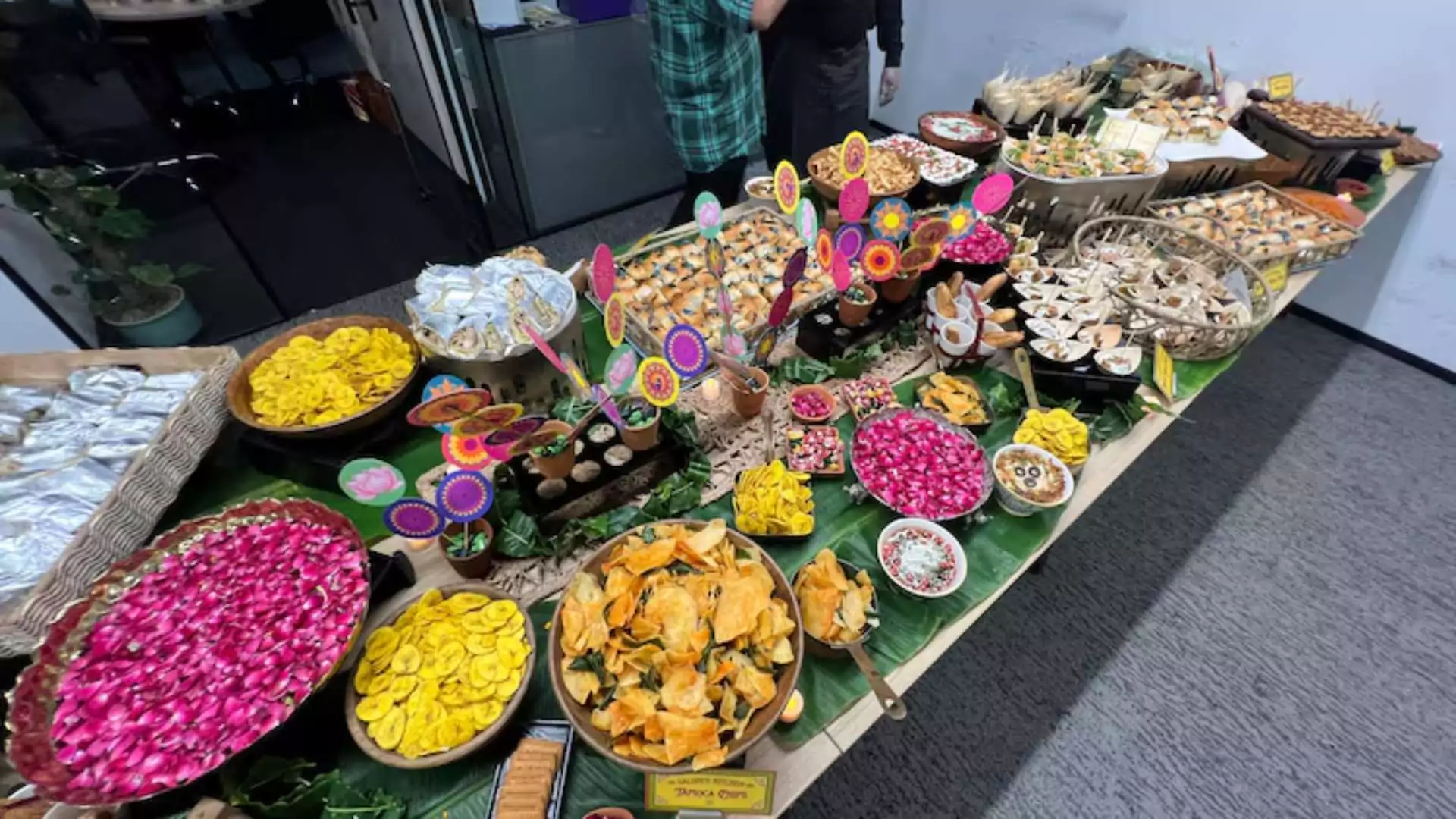For those who relish hosting or attending social gatherings, the rise of grazing tables is hard to miss. These visually stunning spreads have redefined the way we serve appetizers and refreshments, evolving into both a culinary delight and an eye-catching centerpiece.
Grazing tables have become a popular feature at various events, from weddings and birthday parties to baby showers—and even funerals. While the concept of communal eating has been around for centuries, it has recently gained prominence in modern social settings, taking the internet and our gatherings by storm.
What is a Grazing Table?
A grazing table is essentially a large, intricately arranged spread of food designed for guests to enjoy at their own pace. Unlike traditional buffets, which often adhere to a more formal structure, grazing tables focus on abundance and variety. Their versatile nature means they can accommodate a wide range of dietary preferences, including plant-based and gluten-free options, ensuring there’s something for everyone.
Suramya Uppal, a chef trained at Le Cordon Bleu in London, returned to Delhi three years ago to establish The Maison Pantry by Saloni’s Kitchen. Her brand specializes in curating grazing tables, charcuterie boards, and gift hampers for various events. Suramya describes grazing tables as “all your favourite foods laid out beautifully on a table with precision and love.” These tables typically feature an array of appetizers, cheeses, desserts, fresh dips, breads, salads, fruits, crackers, chips, and even beverages.
Richa Agarwal, founder of The Platter Tales in Mumbai, provides her perspective on the trend: “Grazing tables are about thoughtfully arranging small, bite-sized portions like zucchini lasagne roll-ups, sliders, and chips with dips that are easy to pick up and enjoy while mingling. Our focus is on balancing a delectable food experience with visual appeal, using fresh flowers, sleek wooden boards, and minimalist decor to create a chic, contemporary look that suits milestone house parties and brand launches.”
Richa notes that “over the past year, grazing tables have gained increasing popularity due to their elegant convenience and visual appeal. The food spread facilitates easy socializing, allowing guests to move around freely while focusing on the event itinerary.”
A Taste of History
Though the modern grazing table is a contemporary innovation, its roots can be traced back to the communal dining traditions of the Mediterranean. Antipasto and mezze spreads have long embraced the idea of leisurely, communal eating, where food serves as both a sensory experience and a means of sustenance.
In ancient India, communal meals symbolized unity and togetherness. The tradition of serving food on a Thali—a round platter used for meals—originated from these communal gatherings. In many communities, sharing food from a common plate or leaf remains a cherished practice.
The grazing table, as we know it, began to gain popularity in Australia and New Zealand in the late 2010s. Caterers offered these elaborate displays as a relaxed yet sophisticated alternative to traditional event catering. The trend swiftly spread to the UK, the US, and beyond, as people sought more visually appealing and informal ways to entertain. This trend is now gaining momentum in India.
Grazing Table vs. Charcuterie Board vs. Buffet
It’s important to distinguish between grazing tables, charcuterie boards, and buffets. While they share similarities, they cater to different needs and scales.
Say Cheese by Ruchi, another Delhi-based brand specializing in cheese and charcuterie platters as well as grazing tables, offers insights into the differences. Founder Ruchi Rai explains, “A charcuterie board is a French style of serving cold cuts, cheese, crudités, fruits, preserves, and bread or crackers, typically on a wooden board for smaller gatherings. In contrast, a grazing table is a larger-scale setup designed for bigger events.”
Ruchi elaborates, “A grazing table differs from a charcuterie board in three ways: audience size, variety, and purpose. While a charcuterie board is meant for intimate gatherings, focusing on a smaller menu with an emphasis on cheese and raw fruits—often complementing wine and served as part of a larger feast—a grazing table caters to larger gatherings. It offers a wider variety of bite-sized options, designed to accompany activities like socializing or product launches.”
Buffets, on the other hand, are typically designed to serve larger audiences, often 75 to 100 people. Grazing tables, in contrast, are suited for 20 to 50 guests and serve as an accompaniment to the main event rather than the primary meal.
What’s on the Menu
A grazing table can include a wide range of items and can be themed to suit different events and preferences. Suramya follows the “4-4-4-4” rule, featuring four types of cheese, four types of bite-sized appetizers, four types of dips, and four types of crackers, along with fresh fruits and individually plated salads.
Themes can add a unique touch to grazing tables. Suramya recalls one memorable event themed “Festivals of India,” showcasing street foods like Bombay vada pav, bhel puri, dhokla, and fusion dips such as pudina tzatziki. “It was our most colorful and grand table,” she says. Themes can range from baby showers to corporate events and beyond, with diverse finger foods beyond just cheese and charcuterie.
ALSO READ: The Nutty Surge: Why Walnuts Are Winning Over the World—And What You Need To Know About Their Risks
Grazing Table Etiquette
When setting up a grazing table, several considerations ensure a smooth experience for both hosts and guests:
- Chef: Keep serving sizes modest, avoid complex double-dip items, and steer clear of foods that are hard to eat. Accessibility is key.
- Host: Label food items clearly, especially for allergens, and arrange the spread to allow easy serving and movement. Bar-height tables and small, light plates work well.
- Guests: Fill plates minimally to avoid mess and use cutlery to keep hands clean.
Benefits of Grazing Tables
Grazing tables eliminates the need for a server, as guests can help themselves, adding convenience and enjoyment to events. “Since all the food is already set up, it removes the fuss of cooking and serving during an event, making it more enjoyable for both guests and hosts,” says Ruchi.
Richa highlights three core benefits of grazing tables: ease of use, visual appeal, and audience engagement. “A grazing table allows the sales team to spend more time with guests, fostering stronger relationships while encouraging mingling and networking.”
The Downsides
Despite their advantages, grazing tables face challenges, particularly in hot and humid weather. “To prevent spoilage, we recommend keeping the table out for no longer than 4-5 hours,” advises Suramya. Indoor setups with controlled temperatures are ideal to ensure the longevity of perishable items.
Why is it so popular?
The rising popularity of grazing tables is evident on platforms like Snapchat, Instagram, and TikTok. Suramya notes, “We’ve introduced options in open-and-serve boxes for smaller gatherings, delivered across Delhi NCR through our website and Zomato. These boxes are a more compact version of grazing tables.”
Richa attributes the trend’s popularity to factors such as dietary restrictions, time constraints, and the growing emphasis on aesthetics. “Grazing table setups effectively address these challenges, offering a visually appealing and interactive dining experience,” she adds.
The increasing interest in grazing tables reflects a broader shift toward more engaging and aesthetically pleasing dining experiences, offering a glimpse into the future of event catering and culinary trends.
MUST READ: The Ultimate Guide To Monsoon Foods: What To Eat For A Healthy Season




















